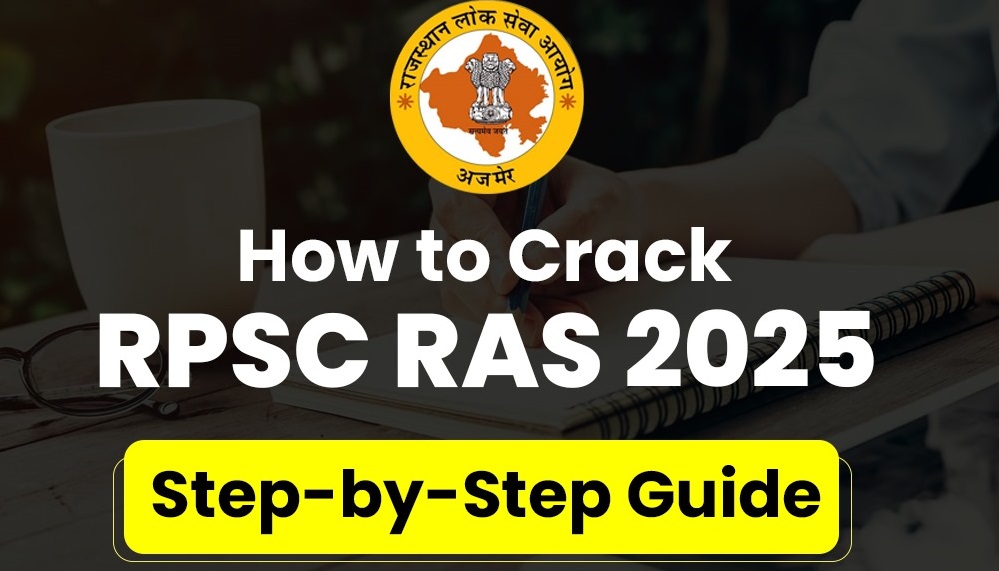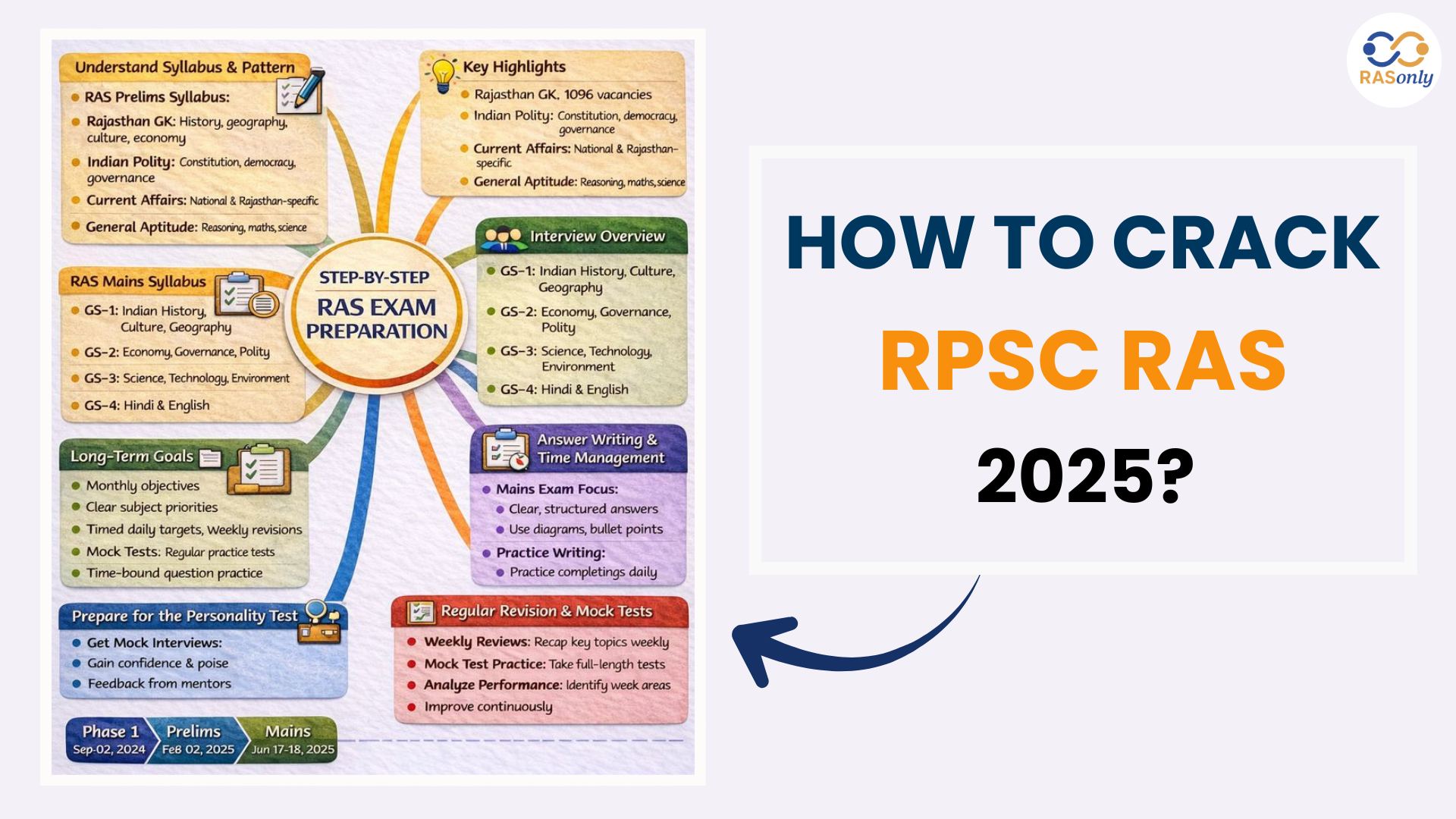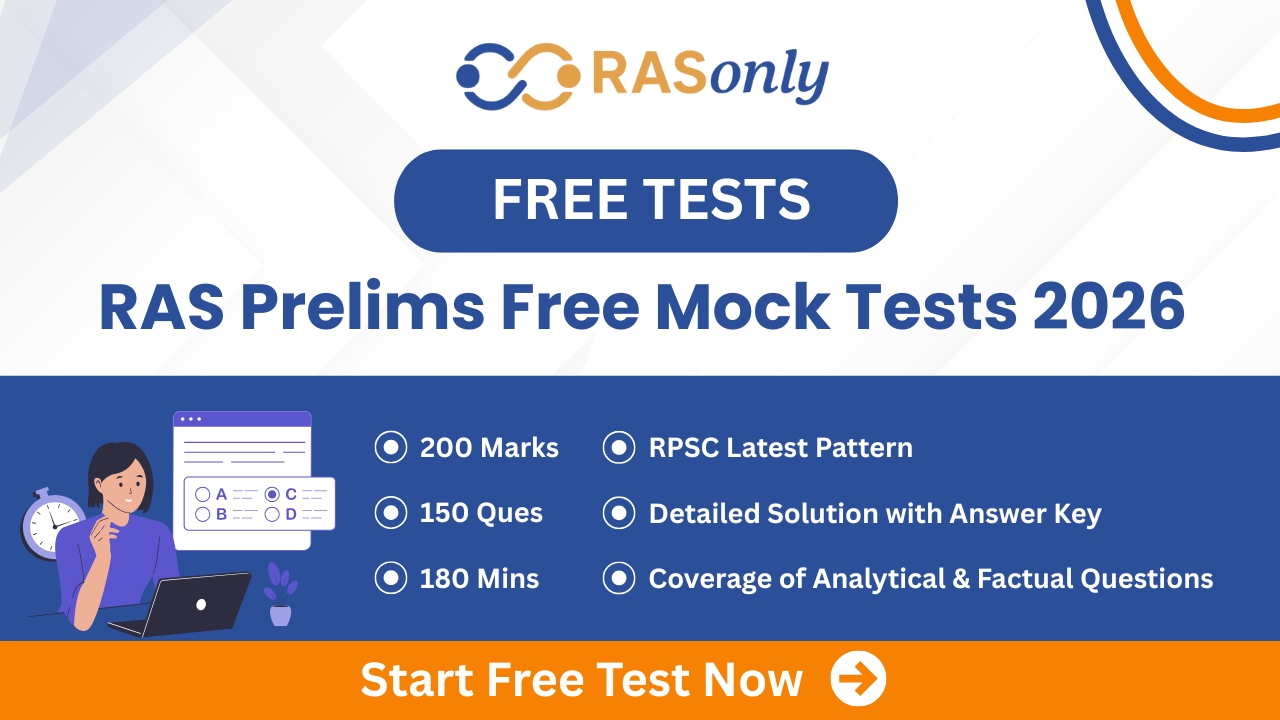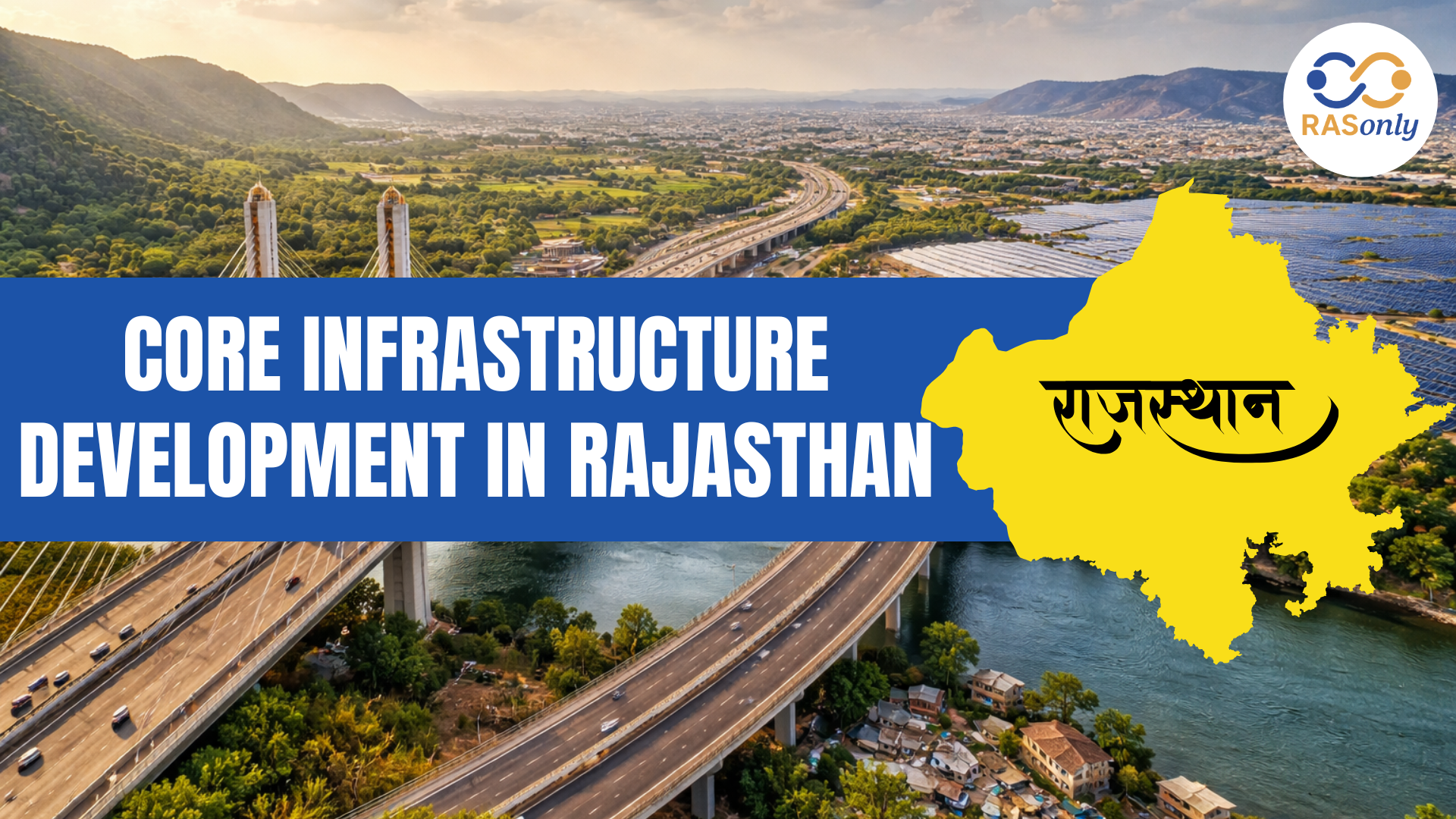Empowered Panchayats, Prosperous Rural Rajasthan
- >
- Preparation Tips
- >
- How to Crack RPSC RAS 2025: Step-by-Step Guide to RAS Exam Preparation
How to Crack RPSC RAS 2025: Step-by-Step Guide to RAS Exam Preparation

Get in Touch with RASonly!

The RPSC RAS 2025 exam is structured preparation strategy covering Prelims, Mains, and Interview stages. Candidates must master the RAS syllabus, understand the exam pattern, and focus on Rajasthan-specific topics, current affairs, and answer writing. Regular mock tests, time management, and revision are essential. Consistent practice, strong conceptual clarity, and interview readiness significantly improve success chances in the Rajasthan Administrative Services examination.

The Rajasthan Administrative Services (RAS) examination which is organized annually by the Rajasthan Public Service Commission (RPSC) serves to recruit officials for different executive positions throughout the state. The positions of Rajasthan Administrative Services alongside Rajasthan Taxation Services and Rajasthan Police Services are among those offered through RPSC examinations. For those looking to succeed in the RPSC RAS 2025 examination they will need an organized approach due to its extreme competitive nature.
This guide will communicate a viable and systematic RAS exam preparation plan to every step of the RPSC RAS 2025 exam, including finding out the RAS syllabus and Ras exam pattern to making the most of the Personality Test (Interview).
RPSC RAS 2025: Exam Structure and Syllabus Breakdown
- Preliminary Exam (Objective Type)
- Mains Exam (Descriptive Type)
- Personality Test (Interview)
Prelims Exam Structure
The RPSC RAS 2025 selection process starts with the Prelims Exam as its initial requirement. The evaluation assesses objective knowledge of different subjects that pertain to Rajasthan and Indian content through an objective examination system.
| Paper | Subject | Marks | Duration |
|---|---|---|---|
| Paper 1 | General Studies (Rajasthan-specific) | 200 marks | 3 hours |
| Paper 2 | General Aptitude Test | 200 marks | 3 hours |
- Negative Marking: 1/3rd of the marks will be deducted for each incorrect answer.
The RAS Prelim exam 2025 phase concentrates on three major topics including general awareness and ability to reason alongside scientific and contemporary know-how. Candidates need to possess strong knowledge of RAS exam preparation with Rajasthan history, geography and Indian polity and efficient abilities to solve logical reasoning and quantitative aptitude questions swiftly.
Preparing for RAS 2025?
Get RAS Prelims Preparation Tips
RAS Mains Exam Structure
The RAS Mains Exam 2025 requires greater detail and thorough examination compared to the RAS Prelims Exam 2025. The RAS Mains Exam uses descriptive-type questions to evaluate subject understanding and writer competency as well as analytical skill.
| Paper | Subject | Marks | Duration |
|---|---|---|---|
| Paper 1 | General Studies 1 (Indian History, Culture, Geography) | 200 marks | 3 hours |
| Paper 2 | General Studies 2 (Indian Economy, Governance, Polity) | 200 marks | 3 hours |
| Paper 3 | General Studies 3 (Science & Technology, Environment) | 200 marks | 3 hours |
| Paper 4 | General Hindi & English (Language) | 200 marks | 3 hours |
The second phase requires candidates to provide detailed written responses with RAS exam preparation about Indian history along with the Indian economy and political structure in addition to science and technology and environmental topics. The assessment focuses on clear writing together with deep knowledge and organized response structure.
Step 1: Understand the RAS Syllabus and RAS Exam Pattern
Students who want to succeed in the RPSC RAS 2025 exam must start by comprehending all the subjects and examination structure. An unclear roadmap makes it simple for students to become lost in the wide area of study material. The following RAS exam preparation displays essential topics which candidates need to concentrate on for their RAS Prelims and Mains examinations.
RAS Prelims Syllabus
- General Knowledge of Rajasthan: Focus on Rajasthan’s history, geography, culture, and economic development.
- Indian Polity & Governance: Study the Indian Constitution, Indian democracy, and political processes.
- Current Affairs: Keep track of national and international news, especially related to Rajasthan and Indian governance.
- General Science: Cover basic concepts from physics, chemistry, biology, and environmental science.
- General Aptitude: Focus on logical reasoning, quantitative aptitude, data interpretation, and basic mathematics.
RAS Mains Syllabus
- General Studies 1: Indian history, culture, and geography.
- General Studies 2: Indian economy, governance, and polity.
- General Studies 3: Science and technology, environment, and disaster management.
- General Hindi & English: Comprehension, writing skills, and grammar.
Step 2: Build a Robust Study Plan
After successful syllabus understanding you should proceed with RAS exam preparation. A well-structured study plan serves as essential for effective time management and achievement of syllabus mastery without becoming excessively stressed.
Study Plan Tips:
- Long-Term Plan: The syllabus should be transformed into monthly objective lists. Devote proper time to each subject as you create a study plan that prevents work from building up at the end of your schedule.
- Daily Goals: Set clear goals for each day. The establishment of a daily study plan will direct your concentration.
- Revision: Weekly revisions need to be included in your study plan. The process of reviewing your studied material frequently results in improved memory retention.
- Mock Tests: Design at least one complete mock test day to occur during weekly schedules. Demonstrating the same conditions as the actual exam and building your test speed are features of these assessments.
RAS Weekly Study Plan:
| Day | Subject | Time |
|---|---|---|
| Monday | General Studies (Rajasthan History & Culture) | 3 hours |
| Tuesday | General Studies (Indian Polity & Economy) | 3 hours |
| Wednesday | General Studies (Geography & Science) | 3 hours |
| Thursday | General Aptitude & Current Affairs | 3 hours |
| Friday | General Hindi & English Preparation | 3 hours |
| Saturday | Mock Test & Revision | 3 hours |
| Sunday | Recap & Relaxation | 3 hours |
Download RAS Previous Year Solved Paper PDF
Step 3: Focus on Answer Writing and Time Management for Mains
The RPSC RAS Mains Exam 2025 follows a descriptive format. Your success depends on enhancing answer writing ability combined with excellent time management and proper RAS exam preparation plan.
Key Answer Writing Strategies:
- Clarity and Structure: Always begin your answer with a brief introduction, followed by a well-structured body, and end with a concise conclusion.
- Use Bullet Points and Diagrams: Use bullet points to make your answer readable and include diagrams wherever applicable, particularly in questions related to geography, science, or economics.
- Time Management: In the Mains exam, each paper is 3 hours long, so practice writing answers in a time-bound manner. Try to complete each answer in about 8-10 minutes to ensure you have enough time to attempt all questions.
Practice Writing:
- Dedicate at least 1-2 hours daily to writing practice.
- Work on improving your writing speed while maintaining clarity.
- Focus on making your answers factually accurate, relevant, and well-organized.
How your optional subject affect your personality test?
Step 4: Prepare for the Personality Test (Interview)
The Personality Assessment stands as the concluding exam in RPSC RAS exam preparation with an assigned value of 100 marks. You must demonstrate your leadership capability along with your communication abilities and personality traits during evaluation.
RAS Exam Preparation Tips for Personality Test:
- Know Your Bio: Be ready to reply to every aspect of yourself including family background along with personal interests as well as your main characteristics plus what you view as your faults.
- Stay Informed: Implement a routine to stay updated about the most recent news pointing to Rajasthan and Indian national developments.
- Mock Interviews: The practice of interviewing with mentors or friends can enhance your speaking skills while building your interview confidence.
- Develop Your Confidence: Respond with clear truthful answers to every question. Your composure along with the way you think during the interview plays an equally significant role as your provided answers.
Step 5: Regular Mock Tests and Continuous Revision
The main route to success in RPSC RAS 2025 exam depends on regular practice and revision. Using mock tests lets you understand your exam readiness while creating an authentic testing condition like the final assessment.
RAS Revision Strategy:
- Weekly Reviews: Weekends should include a thorough review of your studied topics.
- Mock Tests: Once per week complete a complete mock test to evaluate your understanding and time handling skills.
- Topic-wise Revision: Review subjects that demand additional focus plus concentrate on areas where you display weakness.
Conclusion
Candidates who dedicate sincere effort and establish a systematic RAS exam preparation plan will be able to succeed in RPSC RAS 2025 despite its difficulty. A successful RPSC RAS exam preparation 2025 requires following a specific study plan which involves dedicated writing practice along with updates on current events and consistent effort throughout all stages. Your success probability in RPSC RAS 2025 exams greatly improves through well-managed time utilization together with learning dedication and practice with mock tests.
FAQs
Mains: Descriptive questions on history, economy, governance, and science.
Interview: Personality test assessing communication and leadership skills.
Language: Hindi and English comprehension and writing skills.
Post Category
- RAS Salary
- Result
- RAS Admit Card
- RAS Job
- RAS Cutoff
- Preparation Tips
- RAS Answer Key
- RAS Exam Analysis
- RAS Syllabus
- RAS Previous Year Papers
- RPSC RAS Exam Pattern
- RAS Interview
- RAS Mains Exam Date
- RAS Vacancy
- RAS Test Series
- RAS Best Books
- RAS Preparation Resources
- RAS Coaching Centre
- History
- Polity
- Geography
- Economics
- Science
- Art and Culture
- RPSC RAS Application Form
- RPSC RAS Notification
RASonly Interview Guidance Program

Mr. Ashok Jain
Ex-Chief Secretary Govt of Rajasthan
- IAS officer of the 1981 batch, Rajasthan cadre.
- Passionate about mentoring the next generation of RAS officers with real-world insights.
- Got retired in Dec 2017 from the post of Chief Secretary of the state of Rajasthan.

Mr. Guru Charan Rai
Ex-ASP / SP in Jaisalmer
- Guru Charan Rai, IPS (Retd), retired as Inspector General of Police (Security), Rajasthan, Jaipur in 2017.
- Served as ASP and SP in Jaisalmer, Nagaur, Sri Ganganagar, Sawai Madhopur, Dausa, Sikar, and Karauli.
- He also held key positions as DIGP and IGP in the Law and Order division.

Mr. Rakesh Verma
Ex-IAS Officer, B.Tech, MBA, and M.A. (Economics)
- IAS officer of the 1981 batch and retired in Chief Secretary Rank.
- Civil servant of high repute and vast experience.
- Has been teaching UPSC CSE subjects for the last six years.
Related Post
Daily Current Affairs for RAS Exam Preparation 2026

Jaipur to Host First BRICS FMCBG Meeting
February 24, 2026
Rajasthan to Boost Skill Training in Border Districts
February 24, 2026
Rajasthan Passes Forest Grants, Boosts Aravalli Conservation
February 24, 2026
NAI Rajasthan World Heritage Exhibition at JKK
February 23, 2026👉🏻 Register Today to Join Classes! 👍🏻
- Team RASOnly -
🎯 Benefits of RASOnly Coaching:
- ✅ 1:1 Mentorship with RAS Officers
- ✅ Experienced and Expert Faculty
- ✅ Free Library Access
- ✅ Daily Minimum 4 Hours Must
- ✅ Comprehensive Study Material
- ✅ Regular Tests & Performance Analysis
- ✅ Personalized Guidance & Doubt Solving
- ✅ Online & Offline Class Options
- ✅ Affordable Fees with Quality Education
Key Highlights:
- 👉🏻 3-Day Refund Policy
- 👉🏻 New Batch Starting from 04 August
- 👉🏻 Registration Amount: Only ₹1000










